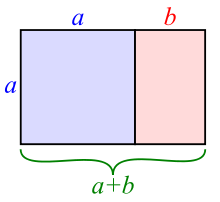
A golden rectangle (in pink) with longer side a and shorter side b, when placed adjacent to a square with sides of length a, will produce a similar golden rectangle with longer side a + b and shorter side a. This illustrates the relationship  .
.
 .
. or
or  ) represents the golden ratio. Its value is:
) represents the golden ratio. Its value is:The golden ratio also is called the golden mean or golden section (Latin: sectio aurea).[1][2][3] Other names include extreme and mean ratio,[4] medial section, divine proportion, divine section (Latin: sectio divina), golden proportion, golden cut,[5] and golden number.[6][7][8]
Some twentieth-century artists and architects, including Le Corbusier and Dalí, have proportioned their works to approximate the golden ratio—especially in the form of the golden rectangle, in which the ratio of the longer side to the shorter is the golden ratio—believing this proportion to be
//



No comments:
Post a Comment